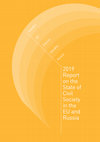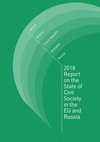Books by Kristina Smolijaninovaitė

Teaching History through the use of World War II Memorials, Oct 2023
This pedagogical guide focuses on World War II and its commemoration in Europe through memorial s... more This pedagogical guide focuses on World War II and its commemoration in Europe through memorial sites. The same war is remembered differently in different countries, which has given rise to many different cultures and practices of remembrance, based on national identity. These differences have in turn led to differences in the way the narrative of the war is taught in different states and European regions.
History educators and historians worked jointly on this guide with such complexities in mind to present eight powerful examples of contrasting World War II memorial sites from Germany, Moldova, Poland, and Russia.
Additionally, this guide outlines pedagogical recommendations for the use of memorials as a teaching tool that history educators may choose to apply and adapt to their own specific teaching context and country.
This guide is available in four languages – English, German, Polish, and Russian – to make it as useful and accessible as possible to different groups of educators.
2020 Report on the State of Civil Society in the EU and Russia, 2021
The Annual Report of the EU-Russia Civil Society Forum (further Forum) reflects the cur-rent situ... more The Annual Report of the EU-Russia Civil Society Forum (further Forum) reflects the cur-rent situation in a range of civil society organisations (CSOs) across Europe. The report presents key trends in the sector, the challenges that some CSOs face and their responses to them, which are illustrated by concrete examples in the text. In the last five years (2016-2020), the Annual Reports have covered 18 EU member states. The 2020 issue contains five chapters: a comparative overview, case studies from Austria, France and Russia and a report on the impact of COVID-19 on civil society.

2019 Report on the State of Civil Society in the EU and Russia , 2020
From 2016 onwards, the EU-Russia Civil Society Forum (CSF) has issued an annual Report on the Sta... more From 2016 onwards, the EU-Russia Civil Society Forum (CSF) has issued an annual Report on the State of Civil Society in the EU and Russia. Each year we study four EU countries and Russia, outline the main trends and challenges for civil society organisations (CSOs) there, solutions to those challenges and legal and political conditions. For 2019, we have chosen Sweden, which has a long history of social democracy and joined the EU in 1995, the UK, an “old” member state, which is going through Brexit at the time of writing, and Estonia and Slovakia, two “new” member states which were in the former Soviet sphere of influence and joined the EU in 2004. For their research, all country authors used available official data, interviewed representatives from between 12 to 16 CSOs and, apart from the UK, conducted a focus group to verify the findings and conclusions.

2018 Report on the State of Civil Society in the EU and Russia, 2019
Civil society in Europe and Russia continues to experience considerable difficulty in a changing, ... more Civil society in Europe and Russia continues to experience considerable difficulty in a changing, troubling, political environment. This is the principal finding to emerge from a study of Civil Society Organisations (CSOs) in Romania, the Czech Republic, Ireland, Greece and Russia, the countries surveyed in the 2018 report on civil society in the EU and Russia conducted by the EU-Russia Civil Society Forum. The Romanian researcher describes the CSO situation as ‘fragile’ and ‘more at risk’ than ever, the relationship between CSOs and government as deadlocked, characterised by ‘low trust, difficult development conditions, corruption and weak state capacity’ and government ‘reducing the space for civil society organisations’. In the Czech Republic, a strong commitment to civil society in the 1990s had withered: the researcher regards it as an open question as to whether CSOs there are headed toward the model of ‘Hungary or the Netherlands?’, fearing the former. Civil society development in Russia is held back by restrictive, repressive laws. In Ireland, civil society organisations are only just emerging from the period of austerity imposed by the government in 2008, but face fresh challenges in new regulations on lobbying. In Greece, enduring a later but comparable period of austerity, CSOs struggle to survive; some had not; but new social movements had emerged quite different from their traditional predecessors.
Papers by Kristina Smolijaninovaitė

Between nationalist propaganda and recognition of minority victims The Russian interpretation of ... more Between nationalist propaganda and recognition of minority victims The Russian interpretation of the Second World War A conversation with Sergey Lukashevsky, director of the Sakharov Center in Moscow. Interviewer: Kristina Smolijaninovaitė KRISTINA SMOLIJANINOVAITĖ: The Sakharov Center as we know deals with the history of Soviet totalitarianism as part of its mission to promote freedom, democracy and human rights. It once held the exhibition "Different Wars" by the EU-Russia Civil Society Forum, which concerned conflicting memories of the Second World War across different parts of Europe. That war often serves as a focal point for collective memory on fascism or imperialism and is therefore a key reference point for defining national and regional identities. It also helps to remind people of the ideals of peace and respect for human lives. So how relevant is the remembrance of the Second World War in your country today? One underlying question also concerns the choice of narrative, with the specific ideals of the Great Patriotic War contrasting with the more general Second World War.
New Eastern Europe, 2021
Historical memory related to the Second World War is too complex for there to be a single version... more Historical memory related to the Second World War is too complex for there to be a single version recognised around the world. This is because historical "truth" is by no means a simple matter of black and white. Addressing various blindspots and imbalances in understandings of the past may subsequently help tackle difficult historical legacies at political, legal and civil society levels.
New Eastern Journal, 2020
The Second World War remains one of the most painful and conflicting episodes of the European nat... more The Second World War remains one of the most painful and conflicting episodes of the European nations' memories. Present conflicts are embedded in history and in the use of history as a political tool. The cases of Poland and Germany illustrate how challenging it can be to commemorate history, especially in a politicised environment.











Uploads
Books by Kristina Smolijaninovaitė
History educators and historians worked jointly on this guide with such complexities in mind to present eight powerful examples of contrasting World War II memorial sites from Germany, Moldova, Poland, and Russia.
Additionally, this guide outlines pedagogical recommendations for the use of memorials as a teaching tool that history educators may choose to apply and adapt to their own specific teaching context and country.
This guide is available in four languages – English, German, Polish, and Russian – to make it as useful and accessible as possible to different groups of educators.
Papers by Kristina Smolijaninovaitė
History educators and historians worked jointly on this guide with such complexities in mind to present eight powerful examples of contrasting World War II memorial sites from Germany, Moldova, Poland, and Russia.
Additionally, this guide outlines pedagogical recommendations for the use of memorials as a teaching tool that history educators may choose to apply and adapt to their own specific teaching context and country.
This guide is available in four languages – English, German, Polish, and Russian – to make it as useful and accessible as possible to different groups of educators.